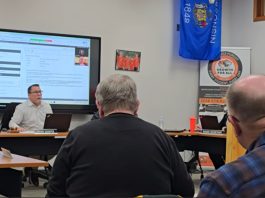Concordia University Wisconsin’s National Security and Space Center (NSSC) is the only center in the Midwest focusing on the intersection of space and American defense. It is hosting its second annual Spring Space Summit on Concordia’s campus in April. More information about the NSSC and the upcoming Space Summit can be found here.
A survey of the growing space sector of the global economy will point to the importance and opportunity that investors have already found far above our planet’s surface.
Americans and allied nations’ citizens are already investing substantially in plans for more efficient space travel, human colonization in orbit and on the moon, and private space stations.
As our citizens push forward into this new frontier, astute observers are no doubt reminded of the United States’ early history. Protecting the pioneers, entrepreneurs, and industrialists as they expand the reach of freedom, democracy and capitalism is the essential role of the American armed forces. As they have done throughout our history, America’s military must be equipped to triumph in any conflicts brought about by our enemies.
A few fundamental points should be understood by the average American citizen when it comes to grasping the importance of space and its quickly growing influence. To begin with, space is the ground on which the great powers of the world will increasingly compete. The winners of that contest will determine control over the terrestrial domain, not just the space domain. Astropolitics will become the determining factor in geopolitics. This is a major shift from previous generations.
Since Apollo, geopolitics has determined what actions nations have taken in space. We stand at a pivotal point in which the direction of influence is shifting from space to earth rather than the other way around. However, even as space impacts geopolitics, the contests for power on Earth will be reflected in the stars.
A careful study of international affairs and the behaviors of state and non-state actors shows this to be plausible, considering how power struggles have been projected throughout history.
Space is the ultimate advantage in national security. The nation or alliance that controls this advantage will be able to dominate international security and international relations on Earth. In addition, space has already led to advancements in science, technology, and medicine and will continue to do so exponentially. As discoveries are made with and for space travel, they will be applied to benefit life on Earth.
Finally, every aspect of the global economy, particularly the United States economy, will be dependent on space, regardless of sector or occupation. George Pullen, Chief Economist of the Milky Way Economy, should be credited for creating a handy analogy. Imagine it is 1992, and someone is trying to convince you about the importance of this “thing” called the internet and how it will revolutionize the way in which commerce is conducted. Would you have realized the future dominance of this “thing” in your life and the life of the economy? Just as those living in the 1990s were on the brink of economic revolution, so we are today with the issue of space.
The exploration and control of space is critical to maintaining the American values of human liberty and security. Space technology today and future innovation offer the ultimate military advantage that assists America in countering a variety of threats from those who seek to do us harm. Soon, it will provide rapid response capabilities for deploying aid and defense to our allies, both on Earth and beyond.
Spacepower furthers the modern way of conducting war and will continue to influence the future.
Space is quite literally the ultimate high ground, and the ability to use it is vital to the future of American national security. Bringing experts in the space sector and homeland defense together to discuss the United States’ future is an important step for the public to gain a better understanding of these topics.
This is one of the goals of Concordia University Wisconsin’s National Security and Space Center (NSSC). The only center in the Midwest focusing on the intersection of space and American defense, the NSSC seeks to promote education in these important fields.
The Center is hosting its second annual Spring Space Summit on Concordia’s campus in April. The Summit’s theme is “How to Achieve the Best Future for the United States” and will be a day-long event dedicated to the exploration of space and its intersection with U.S. homeland defense. Orson Scott Card, a well-renowned science fiction author, will be the keynote speaker, focusing on the changing landscape of a reality thought to be science fiction only a few decades ago.
Other speakers include U.S. Space Force executives, such as Gen. John Shaw (U.S. Space Force Deputy Commander of Space Command, Three Star General, ret.) and Dr. Joel Mozer (U.S. Space Force Director of Science, Technology and Research). Rounding out the event speaker list are space industry leaders, such as George Pullen, Dr. Martin Edwards and Rick Tumlinson, who approach the topic from a private business outlook.
The Spring Space Summit will take place on April 13 on Concordia University Wisconsin’s campus, kicking off at 9:30 a.m. and ending in the afternoon at 4 p.m. Tickets are $20 for community members, while students of all ages get in for free. Tickets include an all-day pass to the Spring Space Summit and lunch.
More information about the NSSC and the upcoming Space Summit can be found here.
Dr. Steve Montreal
Professor of Political Science – Concordia University Wisconsin – National Security and Space Center; Chairman, Board of Advisor, National Security and Space Center
Alyssa Giese
Research Assistant, National Security & Space Center
Vice President, Philosophy Club
Secretary, Concordia YAF











